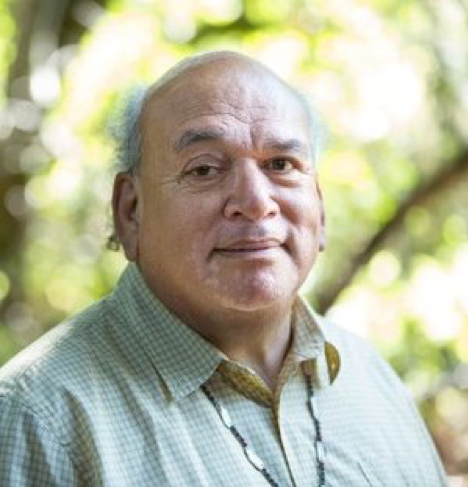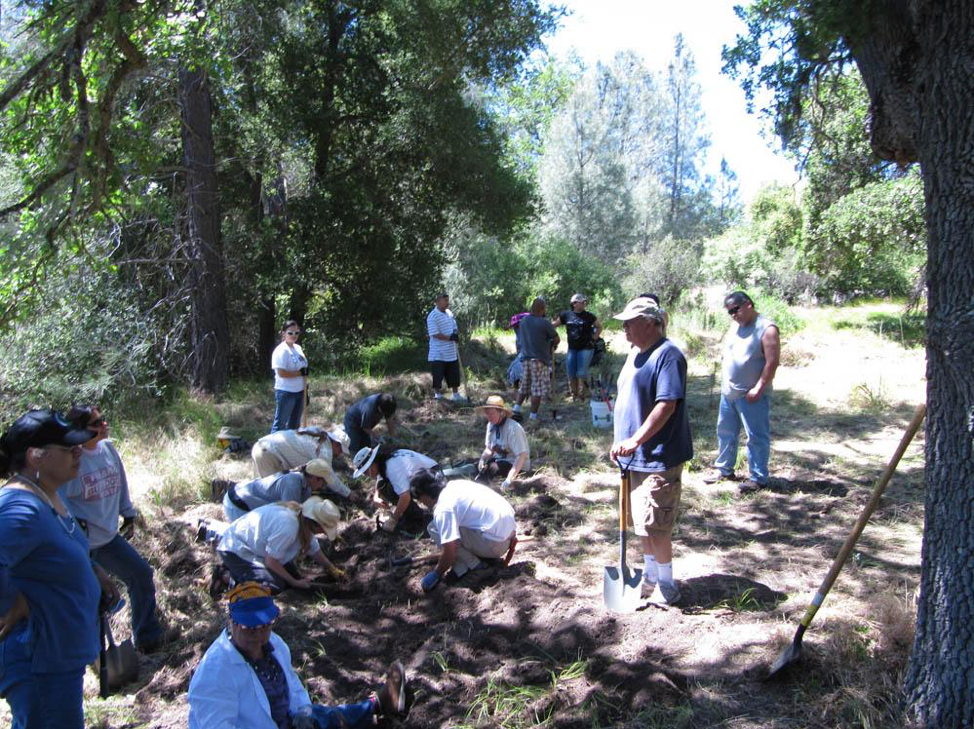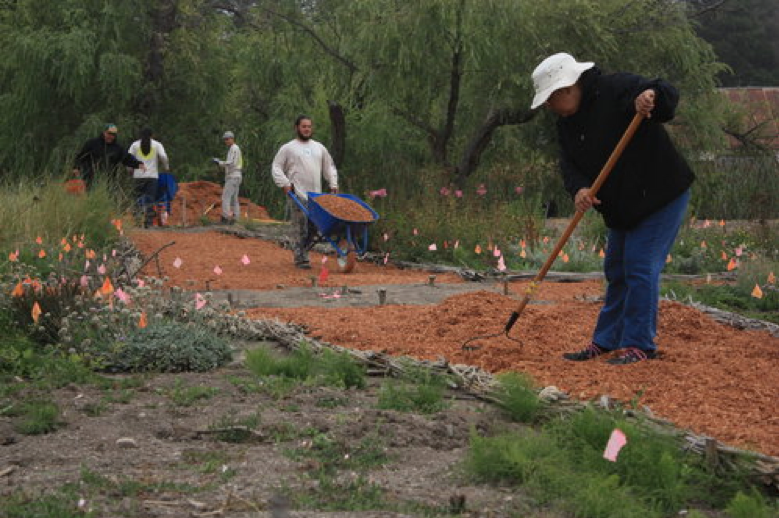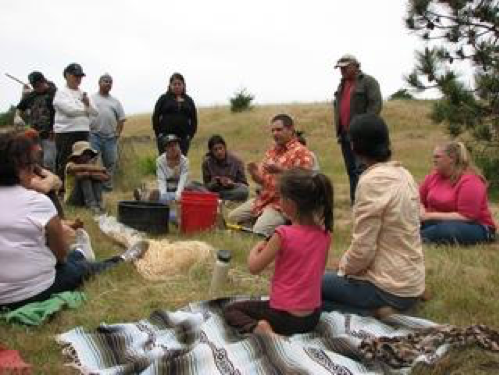Valentin Lopez: Decolonizing Santa Cruz Through Action
by Justin Luong
 Valentin Lopez is the current chairperson of the Amah Mutsun Tribal Band. Chairman Lopez remembers being immersed in the natural world ever since he can remember. To him, being a naturalist, is someone who understands our responsibility as humans is to take care of mother Earth and all living things. To Chairman Val Lopez, humans are not separate from nature, but one connected system with many parts. Chairman Lopez believes that everyone is already a naturalist, and they just have to recognize that all the natural components surrounding us are our relatives and we need to treat them that way. The trees, the fish, the air, the fog, they all need to be respected, and we need to listen to them and the stories they tell.
Valentin Lopez is the current chairperson of the Amah Mutsun Tribal Band. Chairman Lopez remembers being immersed in the natural world ever since he can remember. To him, being a naturalist, is someone who understands our responsibility as humans is to take care of mother Earth and all living things. To Chairman Val Lopez, humans are not separate from nature, but one connected system with many parts. Chairman Lopez believes that everyone is already a naturalist, and they just have to recognize that all the natural components surrounding us are our relatives and we need to treat them that way. The trees, the fish, the air, the fog, they all need to be respected, and we need to listen to them and the stories they tell.
The Amah Mutsun were descendants from indigenous people from the Santa Cruz and San Juan Baptista areas. Although the Amah Mutsun are not a federally recognized tribe, they continue to work against legacies of colonialism and to gain tribal sovereignty. This is especially important because the Amah Mutsun are no longer able to live in the areas their ancestors had, due to high land costs. This has pushed a lot of lower-income tribal members and youth to live on the outer limits of where their ancestors originally occupied.
Chairman Lopez’s, as well as the Amah Mutsun Tribal Band, mission is to make sure that all of Mother Earth and its inhabitants are taken care of, and to continue spreading that message. Chairman Lopez has taken several actions on multiple fronts with the Amah Mutsun Tribal Band and the Amah Mutsun Land Trust to revitalize Amah Mutsun culture, life and history. Some (but not all) actions taken by Chairman Lopez that will be highlighted in this exhibit are: 1) cultural relearning of the land and cultural practices; 2) stewardship of unceded Amah Mutsun land; 3) focusing on providing high-quality and diverse education for tribal youths; and 4) developing relationships and partnerships with local land agencies, non-profits and various levels of government to complete needed research to effectively steward the land.
Restoring Indigenous Knowledge
Chairman Val Lopez has been working creatively in multiple ways to regain history lost because of violent periods of colonization. First, he has been working and collaborating with neighboring tribes, to learn more about their customs and how they take care of their land, plants, animals and ocean. They would exchange cultural practices and history and Chariman Lopez would find ways to incorporate sister tribes’ cultural practice for Amah Mutsun relearning.
Chairman Lopez has also been working to decipher thousands of anthropological field notes from the previous chairperson, Chairwoman Ascencion Solorsano, who was well known for her political activism at a federal level, but was also known locally as a healer with vast knowledge of local indigenous plants in Santa Cruz. Chairwoman Ascencion knew where to find local flora and fauna and had a wealth of knowledge of tribal history and spirituality.
At UC Santa Cruz, the Amah Mutsun Tribal Band are working with Rick Flores, to relearn traditionally used indigenous plants (ethnobotany). Amah Mutsun Tribal Members can steward and collect traditionally and culturally valuable plants for Amah Mutsun cultural work within the California Conservation Gardens at the Arboretum, in the Amah Mutsun Relearning Program, coordinated by Rick Flores. Because the staff like Rick at the Arboretum were so supportive, this was a useful step in starting to regain trust towards the non-tribal community discussed later. Some examples of plants that Amah Mutsun Tribal members learned how to grow and harvest were Elderberry (Sambucus nigra) and soap plant (Chlorogalum pomeridianum).
Furthermore, in partnership with the Midpeninsula Open Space District, Chairman Lopez was able to ensure protection of the Amah Mutsun place of creation, Mt. Umunhum, from Amah Mutsun creation stories. The peak of the mountain was previously taken from Amah Mutsun holding to establish a military base and set-up radio towers. The military base was decommissioned in the late 80s and acquired by the Midpeninsula Open Space District. Eventually a relationship between Chairman Lopez and the Open Space District was developed and flourished, and he was able to work with them to permanently protect the area. However, Chairman Lopez wanted to make sure the land was accessible for everyone, so it is now conserved and as conservation site through an land easement to ensure the holy prayer site could be accessed for all, not just Amah Mutsun.
Lastly, Chairman Lopez has been working with researchers from UC Santa Cruz and UC Berkeley and State parks, to gain access to unceded Amah Mutsun land so tribal members can learn more about cultural landscapes and how to better steward the land, which began in 2007.
Stewardship of Unceded Amah Mutsun Land
 The Amah Mutsun Tribal band became reinvigorated to resume one of its prime missions of land stewardship under the Leadership of Chairman Valentin Lopez in 2007, which was previously disrupted by three separate periods of colonization. To do this work the Chairman Lopez and the Amah Mutsun Tribal Band established connections with numerous land-owning organizations such as UC Santa Cruz, State Parks, National Parks, non-profits, and local small businesses like Pie Ranch.
The Amah Mutsun Tribal band became reinvigorated to resume one of its prime missions of land stewardship under the Leadership of Chairman Valentin Lopez in 2007, which was previously disrupted by three separate periods of colonization. To do this work the Chairman Lopez and the Amah Mutsun Tribal Band established connections with numerous land-owning organizations such as UC Santa Cruz, State Parks, National Parks, non-profits, and local small businesses like Pie Ranch.
The Amah Mutsun started working and doing research specifically at local State Parks and Pinnacles National Park in collaboration with researchers from UC Berkeley and UC Santa Cruz. This was important to the Amah Mutsun and Chairman Lopez because it could help improve stewardship of indigenous grasslands. This was especially important because a lot of land practices have been lost because of periods of colonization, and further reinforced through land laws that restricted burning and removed indigenous people from their ancestral land.
The Amah Mutsun’s work with UC Berkeley takes place in Quiroste Valley in Año Nuevo State Park. In this project the tribal members are working to restore historic coastal prairie habitats that have been encroached upon by trees and shrubs. This issue is common in many California grasslands due to cessation of indigenous stewardship when Spanish conquistadors arrived. After removing encroaching trees and shrubs, the area was replanted with native prairie species by the Tribal Band. This directly supports Amah Mutsun’s mission of stewarding the Earth, by providing for indigenous insects and animals that may rely on indigenous plants.
 At Pinnacles National Park, Chairman Lopez and the Amah Mutsun Tribal band are working with researchers for UC Santa Cruz to better understand how to restore and steward for indigenous annual wildflowers that likely may not persist without regular disturbances. At Pinnacles they are testing the efficacy of prescribed fire, mowing and grazing on sustaining these annual wildflowers. Additionally, Pinnacles National Park has abundant populations of basket weaving plants, and is also a site where Tribal members can collect materials to practice cultural activities.
At Pinnacles National Park, Chairman Lopez and the Amah Mutsun Tribal band are working with researchers for UC Santa Cruz to better understand how to restore and steward for indigenous annual wildflowers that likely may not persist without regular disturbances. At Pinnacles they are testing the efficacy of prescribed fire, mowing and grazing on sustaining these annual wildflowers. Additionally, Pinnacles National Park has abundant populations of basket weaving plants, and is also a site where Tribal members can collect materials to practice cultural activities.
Chairman Lopez and the Amah Mutsun also partnered with a local small business, Pie Ranch, just a few miles north of Davenport on Highway 1. At this location, the tribe partnered with Pie Ranch to create small display gardens to educate non-tribal public members about the existence and work of the Amah Mutsun Tribal Band and their history in this area.
Building Networks
It may seem like the action lead by Chairman Lopez was bound to happen as our society continues to recognize past legacies of colonialism, but it important to remember it likely would not happened without the dedication physical and emotional labor Chairman Lopez put into establishing meaningful and trustworthy partnerships.
“Whenever our elders asked us to report to the path of our ancestors, it was hard to establish partners. It was hard because the past three colonial periods destroyed our humanity, self-esteem, dignity, culture, so it was hard to establish new partnerships.”
 Chairman Lopez recalls when the tribal elders first asked the Tribal council to resume the path of their ancestors. To do so would require establishing reciprocal partnerships which were laden with a legacy of betrayal, which made it especially hard to trust outsiders. Past histories of colonization destroyed indigenous self-being and a lot of the cultural practices and rites of the tribe were almost lost in the process. Accordingly, establishing networks was an emotionally laborious task that was difficult to achieve, yet Chairman Lopez was able to establish a meaningful connection with Rick Flores and Brett Hall, who managed the California Conservation Gardens. Their partnership began with relocating and rebuilding a historic campus sweat lodge, which then developed later into a deeper program of relearning. This later fostered the creation of the Amah Mutsun Relearning Program. The tribal members also now have established relationships with the UC Santa Cruz Natural Campus Reserve, to expand locations for ethnobotanical collections. Other important relationships built by Chairman Lopez and the Amah Mutsun band are with Robert Cuthrell at UC Berkeley and Quiroste Valley. Additionally, Chairman Lopez was able to build relationships with the Midpeninsula Open Space District which allowed the tribe to regain access to their creation site and allow for regular access for cultural ceremonies and rites at Mt. Umunhum.
Chairman Lopez recalls when the tribal elders first asked the Tribal council to resume the path of their ancestors. To do so would require establishing reciprocal partnerships which were laden with a legacy of betrayal, which made it especially hard to trust outsiders. Past histories of colonization destroyed indigenous self-being and a lot of the cultural practices and rites of the tribe were almost lost in the process. Accordingly, establishing networks was an emotionally laborious task that was difficult to achieve, yet Chairman Lopez was able to establish a meaningful connection with Rick Flores and Brett Hall, who managed the California Conservation Gardens. Their partnership began with relocating and rebuilding a historic campus sweat lodge, which then developed later into a deeper program of relearning. This later fostered the creation of the Amah Mutsun Relearning Program. The tribal members also now have established relationships with the UC Santa Cruz Natural Campus Reserve, to expand locations for ethnobotanical collections. Other important relationships built by Chairman Lopez and the Amah Mutsun band are with Robert Cuthrell at UC Berkeley and Quiroste Valley. Additionally, Chairman Lopez was able to build relationships with the Midpeninsula Open Space District which allowed the tribe to regain access to their creation site and allow for regular access for cultural ceremonies and rites at Mt. Umunhum.
Inspiring Tribal Youth
For Chairman Lopez, its especially to provide meaningful education for tribal youth that expands their view of the world. Its important to spend time on the youth because they are the ones that are going to go out into the world, learning new practices, and coming back to their tribe to try and make it better. Teaching and inspiring tribal youth is also some of the most rewarding and memorable times Chairman Lopez recalls. Because the Amah Mutsun are not federally recognized as a sovereign tribal nation, they do not have any land and the youth are dispossessed from the land their ancestors occupied. Accordingly, Val has taken it upon himself to create a youth camp for tribal youth so they can come out every summer for two weeks to see their ancestral land and visit the coastal area. A lot of them are from the Madera area, where it is more affordable to live, but have never seen the ocean their ancestors connected with. Every time the tribal youth come out to the summer camp, they are astounded by the amazing beauty mother earth has to offer and understand that it is their duty to protect and steward this the beauty and resources mother earth offers us. Even now in times of COVID-19, Chairman Lopez has persisted with this mission. Because they could not meet in 2020 because of COVID-19, Chairman Lopez set up a remote program where they could learn about these lands. During these times, Chairman Lopez builds the confidence in tribal youth about their connection with nature through interactions with all the nature around them and through stories about nature.
Improving Access for Indigenous 'Naturalists'
“We say that the destruction and domination we experienced, never ended, and it continues to this period.”
Everywhere we go, there are still no trespassing signs. However, a lot of these lands were unceded lands that were taken from the Amah Mutsun (and other tribal groups) without compensation. Although Chairman Lopez believes people should not own the land, he does believe all people should be able to access it, especially people that were historically and spiritually tied to it. And now because of how their land was distributed, they cannot access much of it. Even tribal members are able to access the land, there are restrictions. For example, if they were looking to learn more about owls or coyotes and build a deeper connection with its natural history, they wouldn’t be able to at many of the lands they can access, like State or National Parks, often close at sunset. Furthermore, the land they were disposed from, they now have to pay monetary compensation to enter and practice their cultural practices or be with the land. Other restrictions that limit their ability to feel connected to the land and its components is the fact that, even when you do pay and go to the parks at the right times, there are restrictions on what plant you can touch or where you can walk, which further limits spiritual release for those who traditionally incorporated these lands and indigenous organisms in their rites and practices. Chairman Lopez’s recommendation to those who want to build meaningful connections with tribal groups, is to do more active work. It requires more than sending an email and establishing a connection, it requires active participation to understand what indigenous tribes require to start feeling a part of our naturalist community.
